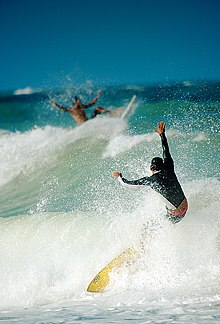| Revision as of 14:12, 25 December 2011 view sourceYngvadottir (talk | contribs)Autopatrolled, Extended confirmed users50,703 edits Reverted good-faith addition - covered in Huizinga quote← Previous edit | Revision as of 14:57, 26 December 2011 view source LoveLately21 (talk | contribs)1 edit →EtymologyNext edit → | ||
| Line 5: | Line 5: | ||
| ==Etymology== | ==Etymology== | ||
| The original meaning of "fun" relates to a ] or ],<ref></ref> a meaning still retained in the phrase "to poke fun at". | The original meaning of "fun" relates to a ] or ],<ref></ref> a meaning still retained in the phrase "to poke fun at". You should look that up... | ||
| ==See also== | ==See also== | ||
Revision as of 14:57, 26 December 2011

Fun is the enjoyment of pleasure and, according to Johan Huizinga, "an absolutely primary category of life, familiar to everybody at a glance right down to the animal level." Fun may be encountered in many human activities during work, social functions, recreation and play, and even seemingly mundane activities of daily living. Fun may often have little to no logical basis, and opinions on whether or not an activity is fun may differ. The distinction between enjoyment and fun is difficult to articulate but real, fun being a more spontaneous, playful, or active event. The perception of time is shortened when one is "having fun".
Etymology
The original meaning of "fun" relates to a hoax or practical joke, a meaning still retained in the phrase "to poke fun at". You should look that up...
See also
References
- Bruce C. Daniels. Puritans at Play. Leisure and Recreation in Colonial New England. St. Martin's Press, New York, 1995. p. xiii. ISBN 0-312-12500-3.
- Alan Dix. "Fun Systematically" (PDF). Retrieved November 1, 2010.
- Attention: This template ({{cite pmid}}) is deprecated. To cite the publication identified by PMID 20424031, please use {{cite journal}} with
|pmid=20424031instead. - Online Etymology Dictionary